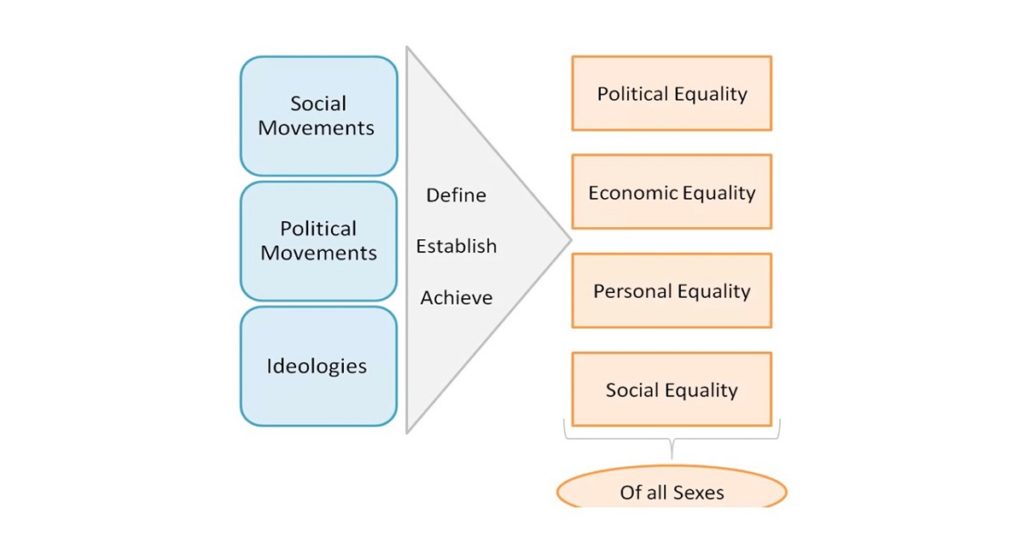Why Feminism is not the New F-Word?
By Avni Gupta
A utopian social thinker, Charles Fourier, in 1837, coined the term feminism. The phenomenon can be literally defined as a system when social and political movements and ideologies help in defining, establishing, and achieving equality in the form of political, economic, personal, and social – of all sexes.

A webinar resolving the question “Why is Feminism not the New F-Word?” was organized by Pratisandhi on April 24, 2020. Ms. Pallavi Mahajan, a Gender Rights Lawyer and UN Fellow, was the esteemed speaker for the session. She is the co-founder of an intersectional feminist NGO called ‘The Azaad Initiative’, which has received the UN Volunteer Status recently. Pallavi is the India Representative of the Global Goodwill Ambassador to carry forward women empowerment in 192 countries and team leader for UN Volunteers.
Around the Globe
The social ideology of feminism has evolved over the years. Although some sociologists believe it to be a sustained phenomenon, many consider it to be sporadic in nature. With time, feminism has observed four waves all around the globe.

- First wave began early in 1848 and went on till 1920. It spread across the English-speaking world, specifically in the UK and the US. Political power, women suffrage, reproductive rights, and economic rights were majorly questioned.
- Next wave began in 1963 and persisted for 20 years. It burgeoned across the western world and focussed on the end of patriarchy, economic equality, education and marriage rights.
- Third wave ignited in 1990 and proliferated throughout the world till 2010. It devoted its efforts to fight for intersectionality, sex positivity, leadership representation, and gender violence.
- Fourth and final wave set its sail in 2010 across the world. Numerous social media occurrences have been observed, including Time’s Up, Me Too Movement, My Body My Choice, Slut walks, and Love is Love.

In India
Feminism is sine qua non in our country due to various causes. Women contribute only 14.40% of GDP. Sex ratio of females to males is 924:1000, which is unfavorably skewed. The labor force comprises about 22% women, while in the agriculture sector, 8.5%. These factors led to the origin of four phases of feminism in India.
- During colonization by the British, mass conversion to Christianity occurred, which led to loss of identity. Sati, infanticide, property rights, and education of women were questioned.
- Gandhi’s resistance to British encouraged participation of women in the struggle. This opened doors for working class women and observed establishment of All India Women’s Conference & National Federation of Indian Women.
- Post-independence, class and sexual divide, female infanticide, patriarchy within religion, and gender-based violence became part of the movement. Accordingly, laws were subjected to change.
- Since the rights of LGBT+, feminists have been demanding provisions beyond legalisation.


Feminism has faced many difficulties with time, including baggage of enlisted myths.
- Misandry
- Necessary in the past, but not in current times
- Matriarchy
- All feminists are bra burning radicals
- All feminists are lesbians
- Men cannot be feminists
- All feminists are career women and against stay-at-home moms
- Opposes marriage
- Against religion

Why is Feminism Earning a Bad Name?
- Radical feminism on the rise
- Misappropriation of ally support
- Sensationalism versus real issues
- Uncensored digital dissemination of views
- Power play of narrative
- Lack of awareness

Why Do We Need Feminism?
- Women form the centre of body shaming.
- Female nudity is used to sell tabloid newspapers.
- Belief – smart people are usually male, while females are dumb but attractive.
- Paranoia of humourless, selfish, men-hating, and aggressive women
- Underrepresentation of women in leadership roles
- Pay gap
- Female genital mutilation
- Gender violence
- Power dynamics

Author

